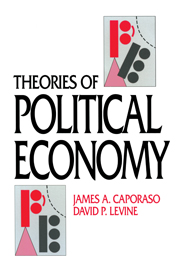Book contents
- Frontmatter
- Contents
- Preface
- Theories of political economy
- Introduction
- 1 Politics and economics
- 2 The classical approach
- 3 Marxian political economy
- 4 Neoclassical political economy
- 5 Keynesian political economy
- 6 Economic approaches to politics
- 7 Power-centered approaches to political economy
- 8 State-centered approaches to political economy
- 9 Justice-centered theories
- Conclusion
- Bibliography
- Index
1 - Politics and economics
Published online by Cambridge University Press: 05 June 2012
- Frontmatter
- Contents
- Preface
- Theories of political economy
- Introduction
- 1 Politics and economics
- 2 The classical approach
- 3 Marxian political economy
- 4 Neoclassical political economy
- 5 Keynesian political economy
- 6 Economic approaches to politics
- 7 Power-centered approaches to political economy
- 8 State-centered approaches to political economy
- 9 Justice-centered theories
- Conclusion
- Bibliography
- Index
Summary
Politics
It is often assumed that political economy involves an integration of politics and economics. It is less often conceded that the very idea of political economy rests on a prior separation of politics and economics. If politics and economics are conceptually fused, political economy cannot be thought to involve a relation between distinguishable activities. Since this point is often confused by talking about politics and economics as “organically linked” or the boundaries between the two as “blurred,” we will comment on what this sense of separation means.
Distinguishing politics from economics does not mean that they are completely separate, isolated from each other, or indifferent to each other. It does not mean that politics and economics do not influence each other or “occur” within the same concrete structures. For example, allocation of goods and services may take place within market or political structures. And concrete organizations, such as banks, firms, interest groups, and unions, may be political or economic according to the activities in which they are engaged and the analytic categories of the investigator (Maier, 1987). So when we say that economics and politics are separate, we mean only that they are analytically distinct.
If economics and politics are distinct, it follows that a book on various theories of political economy must take account of these differences. The challenge is twofold. First, we must identify different conceptions of the economic and political.
- Type
- Chapter
- Information
- Theories of Political Economy , pp. 7 - 32Publisher: Cambridge University PressPrint publication year: 1992

